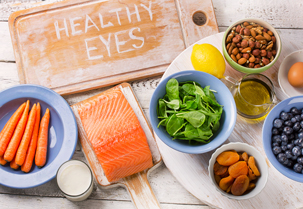
How does a diet affect the condition of the eyes? |
| 25.05.2021 |
 A properly balanced diet not only positively affects the figure and general well-being, but it can also contribute to strengthening the eyes and improving the vision. It is said that a colourful diet is the healthiest, so it is worth making sure that our plate contains all sorts of fruit, vegetables, nuts, seeds, whole grain cereals, healthy fats and protein products such as meat, fish and dairy foods. Only in this way will the body be provided with all the vitamins and minerals it needs. Particular attention to deficiencies of the above products should be paid by those who have to follow a special diet due to medical indications and thus have to eliminate certain ingredients from the menu, as well as those who switch to vegetarianism or veganism.
A properly balanced diet not only positively affects the figure and general well-being, but it can also contribute to strengthening the eyes and improving the vision. It is said that a colourful diet is the healthiest, so it is worth making sure that our plate contains all sorts of fruit, vegetables, nuts, seeds, whole grain cereals, healthy fats and protein products such as meat, fish and dairy foods. Only in this way will the body be provided with all the vitamins and minerals it needs. Particular attention to deficiencies of the above products should be paid by those who have to follow a special diet due to medical indications and thus have to eliminate certain ingredients from the menu, as well as those who switch to vegetarianism or veganism.
Vitamin A – plays an essential role in maintaining good eyesight. Its deficiency can lead to twilight blindness and a so-called dry eye syndrome. In the form of retinol, it can be found in products of animal origin, including eggs, liver, milk, butter, fish oil or fish (fatty foods such as mackerel are also rich in Omega-3 fatty acids). As beta carotene, it is found in fruit and vegetables, for instance carrots, broccoli, grapefruit, tomato, red peppers and lettuce. It is the easiest to remember that its source is green leafy vegetables as well as fruit and vegetables of yellow, orange and red colour.
B vitamins – each of them has its own function, and together they are responsible for proper functioning of the nervous system. The deficiency of B vitamins can be manifested by tremor of the eyelids or a feeling of excessive fatigue, so it is worth supplementing them by eating legumes, liver, dairy products, eggs or nuts.
Vitamin C – can prevent the progression of cataract and macular degeneration. It is necessary for the synthesis of collagen, which ensures the durability of the ocular blood vessels. Lemons are a widely known source of this vitamin, but the vitamin concentration varies depending on the part of the fruit. Other good sources of vitamin C are blackcurrants, kiwis, strawberries, peppers, broccoli, tomatoes, citrus fruit and pickles.
Vitamin D – its task is to regulate the calcium-phosphate balance in the human body. Disturbed calcium-phosphate homeostasis may result in such eye conditions as cataract, glaucoma or short-sightedness. The body has the ability to produce vitamin D upon exposure to UV rays from the sun, so it is worth supplementing the vitamin in the autumn-winter period.
Vitamin E – is important for the proper development of the nervous system and the organ of vision. It contributes to the prevention of the development of cataract and macular degeneration. Foods of plant origin are rich in this vitamin – all kinds of seeds and nuts as well as fats obtained from them, whole grain cereals, fruit and vegetables such as avocados, blackberries, asparagus or beet leaves.
In addition to vitamins, minerals are also needed for the proper functioning of the eyes. The most important of these are zinc, selenium, copper and manganese. The first plays a very important role in the proper work of the retina and in particular – the macula. It allows us to distinguish between various shades of grey and see after dusk. It is also designed to maintain optimal levels of vitamin A in the blood. Its deficiency contributes to the degeneration of retinal cells and can lead to short-sighteness. Selenium, on the other hand, helps to remove free radicals from the body and plays a crucial role in the process of treating cataract. Copper is responsible for the protection and strengthening of the ocular blood vessels. All of these minerals can be found in cocoa, shellfish, organ meats and nuts, among others. Also, do not forget to drink the right amount of fluids!
Lutein – The human body does not produce lutein, so it is of great importance to provide it in adequate amounts in our diet. It is synthesized only by plants. It can be found in green vegetable leaves and yellow and orange fruit and vegetables. Kale and spinach are believed to have the highest content of lutein among vegetables. Lutein protects retinal capillaries and macular photoreceptors from damage, which can reduce the risk of developing cataract.
Vitamins and minerals can form excellent combinations which ensure much greater benefits for the proper functioning of the body. Therefore, you should take care of your eyes by following a properly balanced diet, rich in all the necessary ingredients. Have your vision and eye condition examined regularly by arranging a specialist ophthalmic examination. To make the appointment call us or submit a filled in contact form available on our website.